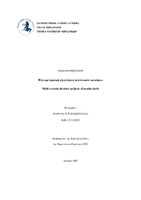| dc.contributor.advisor | Στράντζαλη, Ελένη | |
| dc.contributor.author | Καλογερόπουλος, Αντώνιος | |
| dc.date.accessioned | 2023-03-01T09:44:25Z | |
| dc.date.available | 2023-03-01T09:44:25Z | |
| dc.date.issued | 2023-02-20 | |
| dc.identifier.uri | https://polynoe.lib.uniwa.gr/xmlui/handle/11400/3772 | |
| dc.identifier.uri | http://dx.doi.org/10.26265/polynoe-3612 | |
| dc.description.abstract | Η παγκόσμια τάση για τη μείωση των εκπομπών του άνθρακα σε συνδυασμό με τους νέους και πιο αυστηρούς κανονισμούς στη ναυτιλία, φανερώνουν την ανάγκη υιοθέτησης ενναλακτικών καυσίμων στα πλοία. Για την επιλογή και αξιοποίηση ενός εναλλακτικού ναυτιλιακού καυσίμου, πρέπει να ληφθούν υπόψη μια πληθώρα κριτηρίων. Για την αξιολόγηση χρησιμοποιήθηκε πολυκριτηριακή ανάλυση και συγκεκριμένα η μεθοδολογία, PROMETHEE II. Στη παρούσα διπλωματική εργασία μελετήθηκαν τα ναυτιλιακά καύσιμα μεθανόλη, αμμωνία, υγροποιημένο φυσικό αέριο και υδρογόνο και αξιολογήθηκαν λαμβάνοντας υπόψη έξι σενάρια με βάση τις προτιμήσεις των ενδιαφερόντων. Τα σενάρια αυτά αναφέρονται στους πλοιοκτήτες, παραγωγούς καυσίμων, κατασκευαστές κινητήρων, κυβερνητικές αρχές καθώς και στα σενάρια συνδυασμού και ισοτιμίας. Τα κριτήρια της αξιολόγησης ανταποκρίνονται σε οικονομικά, περιβαλλοντικά, τεχνικά και κοινωνικά θέματα. Συνολικά λαμβάνονται υπόψη 9 κριτήρια: εκπομπές καυσαερίων, μείωση φορτίου, αξιοπιστία παροχής καυσίμου, κανονισμοί, κόστος επένδυσης, κόστος συντήρησης και λειτουργίας, εκτιμώμενο κόστος καυσίμου το 2030, ρίσκο προληπτικών μέτρων και ρίσκο σε περιπτώσεις βλαβών. Η διαδικασία της αξιολόγησης οδηγεί στην κατάταξη των εναλλακτικών ναυτιλιακών καυσίμων. Τέλος, τα αποτελέσματα που προκύπτουν, περιλαμβάνουν χρήσιμα συμπεράσματα ως προς τη χρήση των ναυτιλιακών καυσίμων. | el |
| dc.format.extent | 86 | el |
| dc.language.iso | el | el |
| dc.publisher | Πανεπιστήμιο Δυτικής Αττικής | el |
| dc.rights | Αναφορά Δημιουργού - Μη Εμπορική Χρήση - Παρόμοια Διανομή 4.0 Διεθνές | * |
| dc.rights | Attribution-NonCommercial-NoDerivatives 4.0 Διεθνές | * |
| dc.rights.uri | http://creativecommons.org/licenses/by-nc-nd/4.0/ | * |
| dc.subject | Μεθανόλη | el |
| dc.subject | Αμμωνία | el |
| dc.subject | Υγροποιημένο φυσικό αέριο | el |
| dc.subject | Υδρογόνο | el |
| dc.subject | Πολυκριτηριακή αξιολόγηση | el |
| dc.title | Πολυκριτηριακή αξιολόγηση ναυτιλιακών καυσίμων | el |
| dc.title.alternative | Multi-criteria decision analysis of marine fuels | el |
| dc.type | Διπλωματική εργασία | el |
| dc.contributor.committee | Λιβανός, Γεώργιος | |
| dc.contributor.committee | Pagonis, Dimitris Nikos | |
| dc.contributor.faculty | Σχολή Μηχανικών | el |
| dc.contributor.department | Τμήμα Ναυπηγών Μηχανικών | el |
| dc.description.abstracttranslated | The global decarbonization movement combined with the increasingly stringent shipping emissions regulations lead to the adoption of alternative fuels in the shipping industry. The alternative fuel selection process is a problem that should take into consideration various criteria. Multi-criteria analysis was used for the alternative fuel evaluation process, and specifically the PROMETHEE II methodology. In this thesis, the marine fuels methanol, ammonia, liquefied natural gas and hydrogen were studied and evaluated considering six scenarios, based on stakeholders’ preferences. The examined scenarios include the influence of ship owners, fuel producers, engine manufacturers, government authorities, and, also, taking into account a combination and parity scenario. The selected criteria cover economic, environmental, technical and social aspects. In total, 9 criteria are considered: emissions, load reduction, reliability of fuel supply, regulations, investment cost, maintenance and operation cost, estimated fuel cost in 2030, risk of preventive measures and risk in case of disasters. The application of the evaluation process has as a result the ranking of alternative marine fuels. The results include useful conclusions regarding the use of marine fuels. | el |


